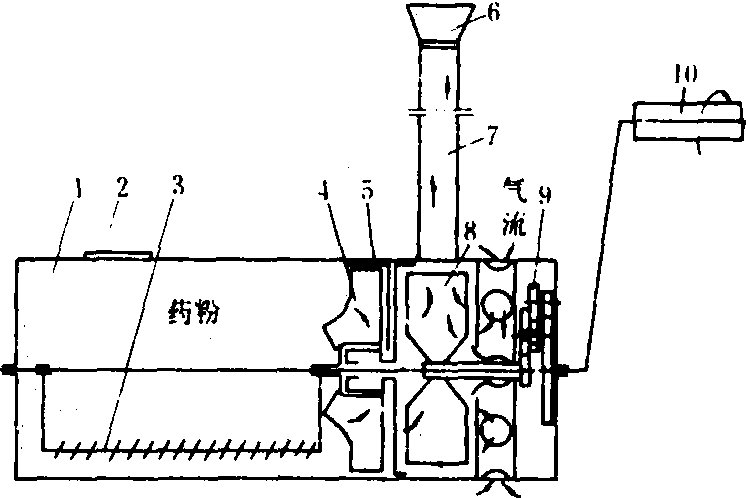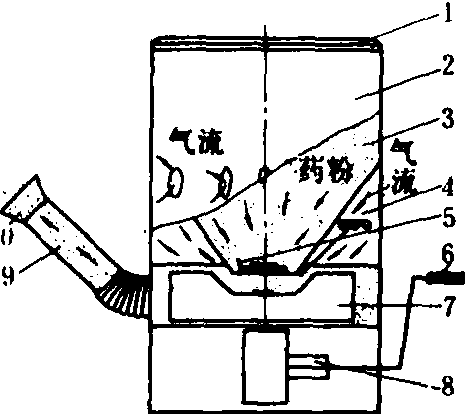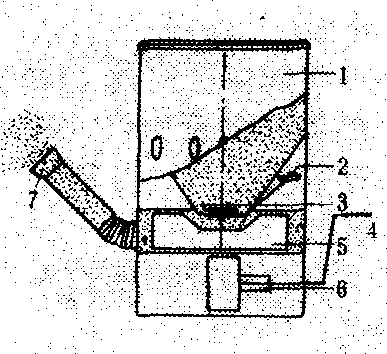手摇喷粉器hand-operated duster
装有手摇风扇的喷粉器。借助于风扇产生的气流,将粉剂农药均匀地喷撒到目标物上。由于有机氯粉剂农药价格低廉,使用简便,效率高,在20世纪30年代,许多国家先后研制各种型式的手摇喷粉器投入使用。中国于50年代开始投入批量生产。
手摇喷粉器可分为胸挂卧式、胸挂立式、背负式和手持式等几种,其结构简单,由粉箱、风扇、齿轮箱、输粉器、粉门开关以及喷管、喷头等部件组成。
胸挂卧式手摇喷粉器的结构如图1,左端为粉箱,其容积为5升,粉箱内安装搅拌架,可防止药粉架空。输粉器为圆盘形,可以均匀地将粉箱内的药粉送入风扇内。粉门开关盘可以调节出粉量大小。齿轮箱在桶身的右端。在靠近风扇处的桶身上开有圆形进气孔。当手柄的转速为36转/分时,风扇叶轮转速可达1 600转/分, 出口风速为10~12米/秒, 喷粉量为0.3~0.5升/分。

图1 胸挂卧式手摇喷粉器
1.粉箱; 2.粉箱盖; 3.搅拌器; 4.输粉器; 5.开关;6.喷粉头; 7.喷粉管; 8.风扇; 9.齿轮箱; 10.摇把
胸挂立式手摇喷粉器的结构如图2,筒身呈圆筒形,粉箱容量为5升,使用时筒身竖立在胸前。粉箱上部为圆柱形,下部呈圆锥台形,可防止药粉架空。输粉器和风扇叶轮都安装在齿轮箱的输出轴上,当转动手柄时,风扇叶轮与输粉器同时旋转,输粉器可将粉箱内药粉送到出粉口。齿轮箱内有两对齿轮,传动比为31,筒身上开有圆形的风扇进气孔。喷粉量为0.5升/分,出口风速为10~12米/秒。

图2 胸挂立式手摇喷粉器
1.筒盖; 2.筒身; 3.粉箱; 4.粉门开关; 5.输粉器;6.摇把; 7.风扇; 8.齿轮箱; 9.喷粉管; 10.喷粉头
背负式手摇喷粉器作业时机具背在身后,粉箱容量为7~10升,出口风速为10~12米/秒。齿轮箱在身后通过链传动到胸前,结构较复杂。
手持式手摇喷粉器药箱容量为0.4升,出口风速为3~4米/分。使用时一手握住把手,一手摇动手柄。适用于庭院。
手摇喷粉器几种型式的工作原理基本相同,作业时转动手柄,经增速传动装置,风扇叶轮高速旋转,产生一股强气流,使粉箱内的粉剂通过输粉器及粉门开关孔进入风扇壳内,与空气混合后经喷粉管和喷粉头喷出。由于射程只有2米左右,效率低,只宜用于小块地作物、庭院、苗圃、幼龄及矮小果树的防治作业。今后随着农药向高效、低毒、低残留,经济方便的微粒剂型发展,手摇喷粉器有可能改型后,兼用于撒布颗粒药剂和颗粒肥料。
手摇喷粉器rotary dusters
装有手摇风扇的喷粉器械。手摇喷粉器出现于20世纪30年代,中国于50年代开始批量生产。其价格低廉、使用简便、工效高,而且当时中国的农药制剂中粉剂占有很大比例,因而获得广泛的应用。主要用于粮、棉、蔬菜等农作物的病虫害防治以及卫生害虫的防治等方面,对于平原、丘陵、特别是干旱缺水地区具有广泛的适应性。
分类和结构 按挂载方式分为胸挂式、背负式、手持式等;按结构形状分为卧式与立式。主要工作部件包括粉箱、风机、传动箱、输粉器、粉量调节器、喷粉管、喷粉头等。❶胸挂卧式手摇喷粉器。粉箱与风机横向排列在一条轴线上挂在胸前作业的手摇喷粉器。粉箱容量5~7升,药粉在粉箱内被横向输入风机,经直管喷头或叉管双喷头喷撒出去,喷粉量0.3~0.5升/分,射程2米,散布均匀,对粉剂的潮湿结块不甚敏感。缺点是机具结构复杂,维修调整比较困难,药粉的装填与清除不太方便。
❷胸挂立式手摇喷粉器。粉箱与风机竖直排列在同一轴线上,挂在胸前作业的手摇喷粉器(见图)。粉箱容量5~7升,箱内药粉垂直向下输入风机,经直管喷头或勺状喷头喷出,最大喷粉量 0.45升/分,射程2米。机具结构紧凑,维护调整方便,缺点是对粉剂的潮湿程度较敏感。

胸挂立式喷粉器示意图
(据穆 琦)
1.粉箱;2.粉门手柄;3.输粉器;4.摇柄;5.风机;6.传动箱: 7.喷粉头
使用 正确使用是获得良好作业质量与高生产率的重要保证。应着重注意:❶检查。摇转手柄应感觉轻快,传动箱与风机运转无摩擦、撞击;粉量调节机构动作灵活。
❷装粉。应关闭粉门;药粉应干燥松散、无杂物;粉箱不可装满,稍留余空。
❸调量。摇柄均匀转动,逐渐开大粉门,以不断粉、不出团状粉为宜。
❹安全。作业人员应穿戴防护用具;行进方向与风向垂直或顺风,如需逆风作业,喷粉管应移向人体后方。
❺封存。作业完毕应倒出残粉;长期封存应将机具内外擦拭干净后放置在干燥通风处。
作业质量 影响喷粉作业质量的因素除操作方法外,粉剂的干燥松散程度也有很大影响。潮湿结块的药粉流散性极差,容易引起喷管堵塞、团状出粉,使分布不匀。作业时自然风力以1~2级为宜,有助于药粉的分布扩散,提高工效; 风力过强将造成药粉的飘失,降低防治效果,污染环境。此外,过大的空气湿度、雨水以及作物枝叶的茂密程度也都会影响喷粉作业质量。(见彩图86)